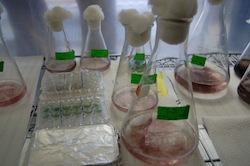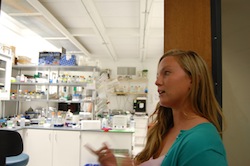 There just might be gold in algal biofuels and the team from Scripps Institution of Oceanography, based at the University of California San Diego (UCSD-SIO), is intent on finding it. UCSD-SIO has been researching micro and macro algae (seaweeds) for their potential to produce biofuels for more than 40 years. Researcher Greg Mitchell believes the search will be well rewarded in the benefits it will provide the country including offering solutions for energy security, hunger, water use, land use, biodiversity, and climate.
There just might be gold in algal biofuels and the team from Scripps Institution of Oceanography, based at the University of California San Diego (UCSD-SIO), is intent on finding it. UCSD-SIO has been researching micro and macro algae (seaweeds) for their potential to produce biofuels for more than 40 years. Researcher Greg Mitchell believes the search will be well rewarded in the benefits it will provide the country including offering solutions for energy security, hunger, water use, land use, biodiversity, and climate.
Seaweeds, a macro form of algae, hold great promise because of their potential for very high yields and high oil production while thriving on non-arable land. Another benefit is that they grow well in saline water. Traditionally crops will not excel in salt water and in some areas of the country valuable agricultural land has been taken out of production due to high concentrations of salt.
But as all researchers know, not all algae is created equal. There are strains of seaweeds that hold great promise for bio-energy and others that hold great promise for producing other products such as high protein meals for replacing non-sustainable ocean-caught fishmeals in aquaculture and other animal diets.
In fact, many algae companies that began with the mission of producing algal fuels have now refocused on producing algae products for the pharmaceutical, plastics, health, and agricultural feed industries. For example, there are strains of seaweeds that UCSD-SIO has been studying that grow well inland and can be used to recycle artificial seawater and waste nutrients from chicken ranches or pig farms. Algae has also been used in farm fish operations from cleaning the ponds to providing feed.
 Mitchell believes that the key to research lies in the lifecycle of the seaweed, especially its sexual phases.“The lifecycle including sexual phases are better known and more easily controlled for some seaweeds,” explained Mitchell. “That may make it easier to breed/hybridize using traditional Mendelian genetics. All companies are looking at how to use classical recombinant methods.”
Mitchell believes that the key to research lies in the lifecycle of the seaweed, especially its sexual phases.“The lifecycle including sexual phases are better known and more easily controlled for some seaweeds,” explained Mitchell. “That may make it easier to breed/hybridize using traditional Mendelian genetics. All companies are looking at how to use classical recombinant methods.”
Medelian genetics focuses on natural recombination rather than human induced modification and since Mendelian genetics focuses on a natural process, the products created from the research will not have the regulatory issues that have hindered the development of algae products created by genetically modified strains.
Yet with all the research focused on algae, there are still several major hurdles that need to be overcome before algal biofuels will become commercially viable. The cost of production must be significantly reduced, elite strains of algae and seaweeds optimized for fuel production need to be developed and test facilities need to scale up to large production areas of several hundred acres.
Mitchell believes the timeline for this to occur spans more than 10 years. To date, all research projects are small and need to be brought to commercial scale levels. “We need several hundred acre demos that would take three years to design, permit and build. Then we need at least two years to get data and improve design,” said Mitchell. “Then we’ll roll out commercial scale over the following five years. We can do all this now at pilot scale but its not yet economically viable. So I see 10 years for this to be turned to economic viability.”
The result, Mitchell believes, will be a multi-trillion dollar industry that will disrupt the use of fossil fuels.
Click here to view photos from my San Diego Algae Tour.

